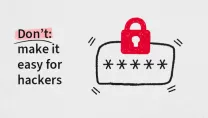How confident are you in your business’ digital defence? Our latest security research told us many things – but most notably, it showed us that confidence is low. In fact, two-thirds (68%) of IT decision makers, from SMEs across Europe, lack confidence in their business’ ability to defend against a cyberattack.
It’s easy to see why this might be the case. Not only are attacks on the rise, but the risks seem to be continually developing – whether that’s because of increased hybrid and remote working, out-of-date cybersecurity training, or even simply because the tactics of cybercriminals are developing. This is particularly notable with AI-generated cyberattacks, where hackers use new technologies to create more sophisticated ‘lures’ in phishing emails.
We’ve outlined some top, actionable tips to help you not only understand the risks but also build confidence in your digital defence.
How prepared is your business?
Before we dive in, let’s explore how prepared SMEs currently are. Our research tells us that four-fifths (79%) of IT leaders feel prepared for IT security threats. There are various reasons why this might be – perhaps the business thinks it has the right cyber protection in place, or has a good track record and hasn’t experienced a data breach. Maybe employees have completed mandatory training courses in cybersecurity. Our research shows that while this may be true, three-fifths (59%) have not increased security training since the introduction of hybrid working – and a third (33%) have experienced a computer virus attack.
Lastly, it could even be the case that a lot of businesses don’t have the full security risk rundown. Whatever the situation, it goes without saying that knowing more can help you be better prepared.

Cybersecurity dos
Some things you should consider doing to strengthen your digital defence.

Many employees now work from multiple locations, communicate via mobile, and connect to public networks. But when was your standard employee security course last updated to align with this?
Cybersecurity training is not a one-time job. Security risks have evolved. Think about how phishing (malicious emails sent by cybercriminals) has expanded to vishing (voice calls) and smishing (SMS). Do employees know all there is to know? As a single security course can quickly become outdated, businesses should ensure all staff, from those at the computer to those on-site or in the classroom, are regularly trained on data protection.

This goes without saying, though it’s something worth remembering. As risks rise, businesses need to be prepared. Crucially, this means having an effective response plan in place. No one wants to be the victim of a cyberattack – but really, you’re better placed to recover swiftly if you know how to respond.
Known as incident response (IR), this is an approach set by the business to respond to and manage cybersecurity incidents effectively. It should include clear, formal steps for employees to follow – and the right cybersecurity solution will help you to implement it, and take action should a breach occur.
Cybersecurity don'ts
To remain one step ahead of cybercriminals, there are some things you should avoid.

The more effectively your business is protected, the less likely you are to fall victim to an attack. A good place to start is your password policy; our research found that a quarter of SMEs have been victims of a password attack.
To help prevent this, implement a password deny list, which prevents employees from using easy-to-guess passwords. Password strength indicators, as well as mandatory character and number requirements can also provide resilience. At the same time, default admin passwords for all devices (including your office MFPs) should be changed, as hackers depend on businesses not considering every endpoint.
Don’t depend solely on single-sign on (SSO) – introduce multiple rounds of identity verification, such as multi-factor authentication (MFA), to add an extra layer of security. Your business would also benefit from disabling SSID broadcasting – this is where networks are visible to others not within the business. If they can’t find your network, they’re less likely to attempt to access it.

Cybercriminals can be deterred by a strong, penetration-proof system – but any gaps in this can make you vulnerable. This much is true for how compatible your devices are with the latest security software.
‘Patch management’ is where everything operating on your network – including software, drivers, and firmware – is kept up to date. An effective cybersecurity solution will help you monitor security compliance, manage the applications and systems your business uses – and identify any gaps in your defence.

Failing to audit your business’ security measures – and ultimately check for potential attacks – is something cybercriminals rely on. And ultimately, it’s much better for you to discover a vulnerability than someone outside the business. Not only can a cybersecurity solution help you to run penetration tests (where systems are checked to see if they can be accessed externally), but they can run a vulnerability assessment to see where your weak spots are.
At the same time, it’s important to continuously ‘assess’ your employees’ security knowledge, through phishing simulation tests. These will help you to identify where any vulnerabilities may lie across teams.
Understand the risks, build your security confidence
The implications of a cyberattack can often strike fear in businesses. That’s why it’s important to understand how yours might be vulnerable, and focus on strengthening your defence.
And though cybercrime has grown in sophistication, there are solutions that can help you stay one step ahead.
Sharp offers a comprehensive family of tailored security services and solutions, giving SMEs comfort in knowing their business is protected around-the-clock.
Find out more about how our Security services and solutions can support your business.

